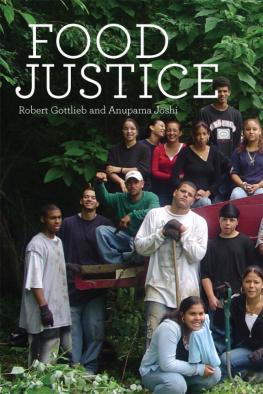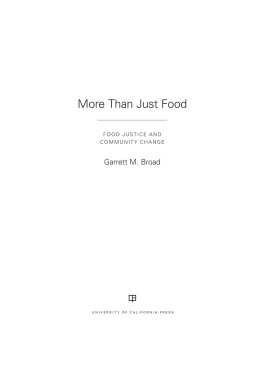Robert Gottlieb - Food justice
Here you can read online Robert Gottlieb - Food justice full text of the book (entire story) in english for free. Download pdf and epub, get meaning, cover and reviews about this ebook. City: Cambridge, Mass., year: 2010, publisher: MIT Press, genre: Politics. Description of the work, (preface) as well as reviews are available. Best literature library LitArk.com created for fans of good reading and offers a wide selection of genres:
Romance novel
Science fiction
Adventure
Detective
Science
History
Home and family
Prose
Art
Politics
Computer
Non-fiction
Religion
Business
Children
Humor
Choose a favorite category and find really read worthwhile books. Enjoy immersion in the world of imagination, feel the emotions of the characters or learn something new for yourself, make an fascinating discovery.
- Book:Food justice
- Author:
- Publisher:MIT Press
- Genre:
- Year:2010
- City:Cambridge, Mass.
- Rating:3 / 5
- Favourites:Add to favourites
- Your mark:
- 60
- 1
- 2
- 3
- 4
- 5
Food justice: summary, description and annotation
We offer to read an annotation, description, summary or preface (depends on what the author of the book "Food justice" wrote himself). If you haven't found the necessary information about the book — write in the comments, we will try to find it.
Food justice — read online for free the complete book (whole text) full work
Below is the text of the book, divided by pages. System saving the place of the last page read, allows you to conveniently read the book "Food justice" online for free, without having to search again every time where you left off. Put a bookmark, and you can go to the page where you finished reading at any time.
Font size:
Interval:
Bookmark:
Food Justice
Food, Health, and the Environment
Series Editor: Robert Gottlieb, Henry R. Luce Professor of Urban and Environmental Policy. Occidental College
Keith Douglass Warner,
Agroecology in Action: Extending Alternative Agriculture through Social Networks
Christopher M. Bacon, V. Ernesto Mndez, Stephen R. Gliessman, David Goodman, and Jonathan A. Fox, eds.,
Confronting the Coffee Crisis: Fair Trade, Sustainable Livelihoods and Ecosystems in Mexico and Central America
Thomas A. Lyson, G. W. Stevenson, and Rick Welsh, eds.,
Food and the Mid-Level Farm: Renewing an Agriculture of the Middle
Jennifer Clapp and Doris Fuchs, eds.,
Corporate Power in Global Agrifood Governance
Robert Gottlieb and Anupama Joshi,
Food Justice
Food Justice
Robert Gottlieb and Anupama Joshi
The MIT Press
Cambridge, Massachusetts
London, England
2010 Massachusetts Institute of Technology
All rights reserved. No part of this book may be reproduced in any form by any electronic or mechanical means (including photocopying, recording, or information storage and retrieval) without permission in writing from the publisher.
For information about special quantity discounts, please email special_sales@mitpress.mit.edu
This book was set in Sabon by Toppan Best-set Premedia Limited. Printed and bound in the United States of America.
Library of Congress Cataloging-in-Publication Data
Gottlieb, Robert, 1944
Food justice / Robert Gottlieb and Anupama Joshi.
p. cm.(Food, health, and the environment)
Includes bibliographical references and index.
ISBN 978-0-262-07291-5 (hardcover : alk. paper)
ISBN 978-0-262-28864-4 (retail e-book)
1. Food industry and tradeMoral and ethical aspects. 2. Food industry and tradeEnvironmental aspects. 3. AgricultureEnvironmental aspects. 4. Sustainable agriculture. 5. FoodMarketing. 6. Grocery trade. I. Joshi, Anupama. II. Title.
HD9000.5.G675 2010
363.8dc22
2010008275
10 9 8 7 6 5 4 3 2 1
d_r0
Series Foreword
I am pleased to present the fifth book in the Food, Health, and the Environment series. This series explores the global and local dimensions of food systems and examines issues of access, justice, and environmental and community well-being. It includes books that focus on the way food is grown, processed, manufactured, distributed, sold, and consumed. Among the matters addressed are what foods are available to communities and individuals, how those foods are obtained, and what health and environmental factors are embedded in food-system choices and outcomes. The series focuses not only on food security and well-being but also on regional, state, national, and international policy decisions and economic and cultural forces. Food, Health, and the Environment books provide a window into the public debates, theoretical considerations, and multidisciplinary perspectives that have made food systems and their connections to health and environment important subjects of study.
Robert Gottlieb, Occidental College
Series editor
Introduction: Taking Root
Rethinking School Food in New Orleans
A year had passed since Hurricane Katrina. Most schools in New Orleans had been destroyed or damaged and had only begun to reopen in 2006. As the rebuilding efforts got under way, education emerged as a critical issue, since the schools had been in such poor shape even before the hurricane. New Orleans residents talked of turning the tragedy into an opportunity to start anew, especially with the school system. But among the voices talking about what needed to be done there was one glaring omission, the voices of the students themselves.
That omission led to the birth of one of the most imaginative and inspirational groups to burst onto the scene in New Orleans, one that sought to apply the emerging food justice approach to improving the school food environment as part of a broader transformation of the schools themselves. A group of about twenty middle school students, calling themselves the Rethinkers, joined in an organizing effort to identify what was wrong with the schools in New Orleans and envision a better way. They had been brought together by Jane Wholey, one-time journalist, media consultant, and activist who had experience training young people to voice their ideas to the public through press conferences and other media strategies.
During the summer of 2006, the Rethinkers met to explore what they could do about their schools. They were not unhappy about losing their old schools, having always assumed that the lack of books, the unsanitary bathrooms, and the rushed and tasteless lunches were just the way the schools were. The group decided it would try to foster public awareness of those problems, compile a set of recommendations, and then see if anybody would listen. As Wholey recalled their discussions, the students became excited, transformed. It felt therapeutic that they could do something. And they learned that summer that they had a voice.
Guided by Wholey, the students decided to hold a press conference at the abandoned Sherwood Forest Elementary School, amid shattered windows, garbage, and ever-present mold. Their recommendations went right to the point. Put doors on bathroom stalls and supply sufficient toilet paper and soap. Allow students time to wash their hands before lunch. Change the fountains so the water that came out was not brown. We are a big part of the system that makes up schools so why should we deserve this? Why shouldn't we have nice schools? the students insisted.
To their surprise, this handful of fifth to eighth graders caught the attention of the pressand the Recovery School District. As a consequence of that first press conference and their summer of preparation, the Rethinkers felt empowered and decided to become a permanent voice. They continued to meet to discuss what was wrong with their schools and what changes could be made, while connecting with people who could provide information about the issues they had identified. They agreed that each year they would hold a summer press conference and seek major commitments from the administration to make the changes based on their recommendations, then monitor progress as the changes were implemented during the school year.
By the summer of 2008, the Rethinkers had chosen to focus on school food and the school cafeteria environment. To them, the issues were clear and visible: the food tasted terrible and the cafeteria conditions were pathetic. Long lines and short lunch periods made it nearly impossible for students to wash their hands, eat, and digest the food. And the list went on, all symptoms of a broken school food operation. The group brought in Johanna Gilligan of the New Orleans Food and Farm Network, a local alternative food policy and advocacy group, as a resource person to work with them. Under Gilligans guidance, the Rethinkers began to learn about alternatives, including bringing local, fresh foods into the cafeteria, changing menus to provide healthy and fresh food, and reorienting the overall school food environment. They also discovered that food had powerful environmental implications, including the ramifications of distant sourcing rather than using local food sources.
That summer, as part of their learning process, the Rethinkers went out to Grand Isle to talk to the local shrimpers and hear their stories. Shrimp was at the heart of the New Orleans food and culture connection and central to the communitys battered identity. Although the New Orleans shrimp industry had been hit hard by Katrina, the Rethinkers learned that the major issue for local shrimpers was the development of industrially farmed, globally sourced shrimp that was heavily laden with chemicals and antibiotics and then shipped to New Orleans and other far-flung destinations. This restructuring of the shrimp industry was directly tied to the globalization of the food supply that was undermining local food cultures and devastating regional food economies. Industrially farmed shrimp, associated with what has been called the Blue Revolution (an aquatic version of the industrial, export-oriented, globally driven Green Revolution), had literally transformed the very nature of the shrimp that were available in restaurants like Red Lobster and stores like Wal-Mart. As the organization Food First described it, semi-intensive and intensive shrimp farms function more or less as aquatic feedlots for shrimp and have environmental impacts similar to those associated with factory farming of cattle, hogs, and poultry, all part of the transformation of food in the late 20th and early 21st century.
Next pageFont size:
Interval:
Bookmark:
Similar books «Food justice»
Look at similar books to Food justice. We have selected literature similar in name and meaning in the hope of providing readers with more options to find new, interesting, not yet read works.
Discussion, reviews of the book Food justice and just readers' own opinions. Leave your comments, write what you think about the work, its meaning or the main characters. Specify what exactly you liked and what you didn't like, and why you think so.











